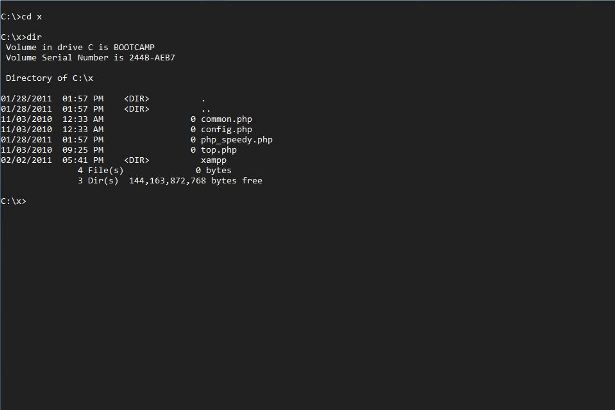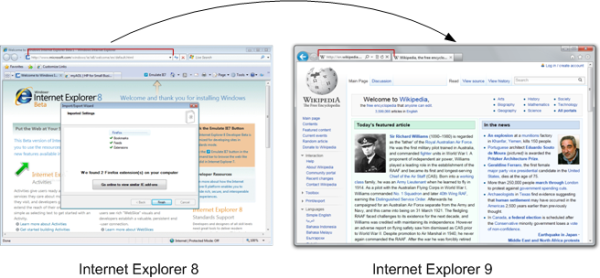Wake up, drink a cup of café, brush my teeth and navigate to www.gizmoron.com or any one of my favorite news sites. That’s a morning routine I sometimes take for granted, and I’m sure some people feel the same. However, have you stopped for a second to ponder on the reason we should remember so many, sometime long “codes” / website names AKA domain names / website addresses? Wouldn’t it be nicer if we simply, did not have to?
It is my personal believe that the evolution of the address field will eventually move us away from the address line. In this post I’ll try to explain the reasons for my evaluation.
1 – Let’s go back in time
Some of us may remember the days of DOS. Similar to today’s command prompt users used to type in weird combination in order to run different applications or scripts. If you’ll be caught using it today by a younger person he’ll probably think your some sort of a hacker.
Back in those days that’s how people ran applications, and took it for granted. That was just the way it was. Then windows and apple OS revolutionized the way we run applications. No longer does one need to remember commands such as “dir” to view the content of folders and “cd” to navigate to different directories. No longer does one need to remember that “fdisk” is a utility to partition and manage your hard drive and so on. The day of the visualized way has arrived. Now users take icons and double clicking for granted. Comparing command prompt to the address bar isn’t that farfetched.
2 – Where are we now?
Did you notice that Internet Explorer 9 looks nothing like Internet Explorer 6? If you look at the newer browsers, apart from speed and compatibility, the most noticeable change would be how there’s more space for the website itself, and less space for other stuff. So what’s getting downsized? You guessed it; the new version of Internet Explorer 9 is the first major browser to dramatically reduce the size of the address bar.
Questions asked now are: will other browsers follow? And if so, what would be the next step? Maybe the address bar would become an autohide / scroll over the top to show component?
3 – The future of mobile browsing
Many would agree that the future of the internet lies in the mobile devices and while I agree with the statement I also think that the above has an effect on how the future internet will shape. Using mobile devices could eventually lead to a situation where most web applications will actually be applications on the cloud or downloadable applications and the data would be kept online. If this is the trend then eventually, not only that we won’t use the address bar as often, but who will even need a browser?
The return of the portals
So, if the prediction is right, we still need a substitute for the address bar do we? Moving most online applications to the cloud could be one option, but it still doesn’t cover it all – what about the not-so-far future? It seems as if the “war” is on the homepage spot on your browser, the one site we need to cover 99% of our online time. It also seems like the major sides are Google and Facebook, with Google already giving a fair substitute to the address bar and Facebook keeps on adding more and more features just to keep you online on Facebook – email, chat, integrated Bing search engine, social news, etc – and while I think Facebook is winning, It’s still not my homepage.
What does it mean?
It is my belief that conglomerates long ago understood the potential of the internet and this is yet another move towards taking over it. It basically means that the internet, once a great place for entrepreneurs with a great idea and a low budget, would become a place where money speaks. The death of the address bar would only be a sign that this is where we’re moving and already big companies are taking their sits, Google for search engines, Facebook for social, Amazon for shopping and Apple for music, media and who knows what else.
Wake up, drink a cup of café, brush my teeth and navigate to www.gizmoron.com or any one of my favorite news sites. That’s a morning routine I sometimes take for granted, and I’m sure some people feel the same. However, have you stopped for a second to ponder on the reason we should remember so many, sometime long “codes” / website names AKA domain names / website addresses? Wouldn’t it be nicer if we simply, did not have to?
It is my personal believe that the evolution of the address field will eventually move us away from the address line. In this post I’ll try to explain the reasons for my evaluation.
1 – Let’s go back in time
Some of us may remember the days of DOS. Similar to today’s command prompt users used to type in weird combination in order to run different applications or scripts. If you’ll be caught using it today by a younger person he’ll probably think your some sort of a hacker.
Back in those days that’s how people ran applications, and took it for granted. That was just the way it was. Then windows and apple OS revolutionized the way we run applications. No longer does one need to remember commands such as “dir” to view the content of folders and “cd” to navigate to different directories. No longer does one need to remember that “fdisk” is a utility to partition and manage your hard drive and so on. The day of the visualized way has arrived. Now users take icons and double clicking for granted. Comparing command prompt to the address bar isn’t that farfetched.
2 – Where are we now?
Did you notice that Internet Explorer 9 looks nothing like Internet Explorer 6? If you look at the newer browsers, apart from speed and compatibility, the most noticeable change would be how there’s more space for the website itself, and less space for other stuff. So what’s getting downsized? You guessed it; the new version of Internet Explorer 9 is the first major browser to dramatically reduce the size of the address bar.
Questions asked now are: will other browsers follow? And if so, what would be the next step? Maybe the address bar would become an autohide / scroll over the top to show component?
3 – The future of mobile browsing
Many would agree that the future of the internet lies in the mobile devices and while I agree with the statement I also think that the above has an effect on how the future internet will shape. Using mobile devices could eventually lead to a situation where most web applications will actually be applications on the cloud or downloadable applications and the data would be kept online. If this is the trend then eventually, not only that we won’t use the address bar as often, but who will even need a browser?
The return of the portals
So, if the prediction is right, we still need a substitute for the address bar do we? Moving most online applications to the cloud could be one option, but it still doesn’t cover it all – what about the not-so-far future? It seems as if the “war” is on the homepage spot on your browser, the one site we need to cover 99% of our online time. It also seems like the major sides are Google and Facebook, with Google already giving a fair substitute to the address bar and Facebook keeps on adding more and more features just to keep you online on Facebook – email, chat, integrated Bing search engine, social news, etc – and while I think Facebook is winning, It’s still not my homepage.
What does it mean?
It is my belief that conglomerates long ago understood the potential of the internet and this is yet another move towards taking over it. It basically means that the internet, once a great place for entrepreneurs with a great idea and a low budget, would become a place where money speaks. The death of the address bar would only be a sign that this is where we’re moving and already big companies are taking their sits, Google for search engines, Facebook for social, Amazon for shopping and Apple for music, media and who knows what else.





















newbie
Can’t think of too many people who still use command prompt commands, ha. How sad. We’re on the verge of seeing Facebook all around us. It’s already quite annoying with Facebook’s latest coupon pilot in the US – trying to take over groupon – jeeezz louise!
Daniel Benami
Thanks for your comment newbie. I’m actually happy that we’re moving away from the address line. In my opinion good user interface is always a plus, but I am worried that the future developments come hand in hand with closing the door for younger entrepreneurs. I believe Facebook is indeed taking a major role, it’s rather ironic when you come to think about it – Mark Zuckerberg himself was once a young entrepreneur who created a product from scratch.